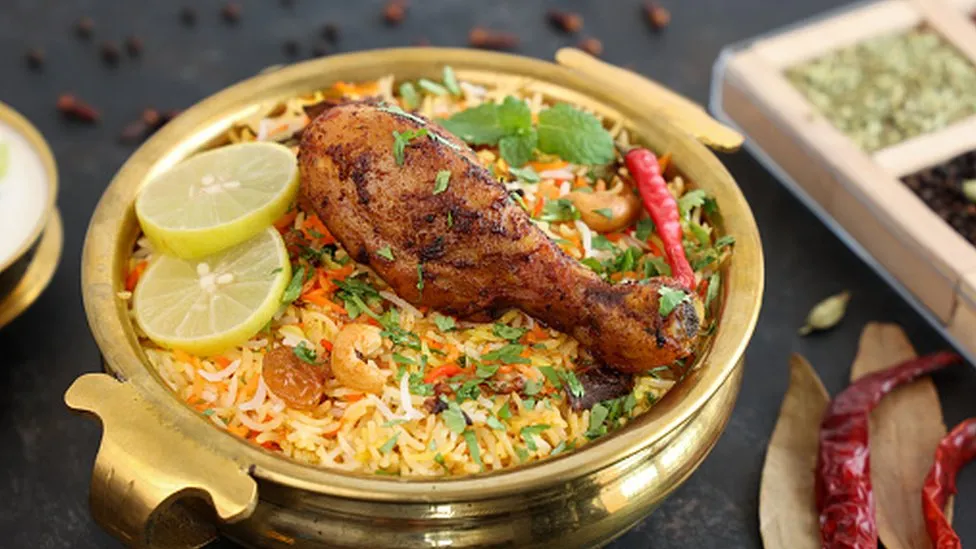Zomato: When a biryani flies hundreds of miles to reach Indians
"A man's desperation for biryani knows no bounds."

That's what drove Anirudh Suresan, a resident of the Indian capital, Delhi, to order the dish from thousands of miles away in Hyderabad, the southern city famous for its biryani, a fragrant dish of rice layered with meat or vegetables.
For good measure, he also ordered tunday kebabs - the skewered lamb patties from Lucknow - and Bengali sweets from Kolkata (formerly Calcutta).
His experience, however, turned out to be far from ideal.
"The biryanis were abysmal, they were devoid of everything that makes biryani a biryani," he told the BBC. "No amount of heating on stove could resuscitate the tundays and any local sweetshop in Delhi could outshine the Kolkata sweets."
Mr Suresan is among thousands of Indians who are betting on food delivery app Zomato's Intercity Legends and going the extra mile - literally - to satisfy their insatiable need for biryanis, rasgullas (balls of cottage cheese dipped into hot sugary syrup) and kachoris (stuffed pies). The firm has partnered with some 120 renowned restaurants from 10 cities that deliver some of India's most iconic dishes within 24 hours through flight.
"The idea was to put India on a platter for the breadth and length of the country," says Kamayani Sadhwani, who is heading the service at the company.
Zomato first began the service in August as an experiment, opening up to residents in south Delhi and parts of Gurugram (Gurgaon), an upscale suburb of the capital. It has since expanded operations to over six cities, including Mumbai and Bengaluru. The company now aims to make the service available across the country as demand grows.
Ms Sadhwani says the offering is centred around "nostalgia" and "exploration".
"Our aim was to cater to the needs of our customers in two ways - by helping them reconnect with their roots through the taste of their hometown cuisine and by offering them an opportunity to discover the vast array of culinary delights our country has to offer," she adds.
The BBC spoke to at least nine other customers who, like Mr Suresan, found the scheme "tepid at best".
But Ms Sadhwani said the customer response "has surpassed our wildest expectations", though she declined to specify the scale of the operations.
"When we started, we thought it would be expensive and a luxury offering. However, our cost projections over time have led us to believe that it is not a luxury," Siddharth Jhawar, vice president of Zomato Global Growth, had told Business Standard last year.
From cutting delivery prices and wait times to dishing out discounts and promising grocery deliveries in minutes - Zomato is not new to experiments. Since its launch in 2008, the company has constantly pushed the boundaries of logistics to achieve profits in India's crowded food market.
Experts say its model also benefitted from the pandemic when restaurants were forced to go online, relying heavily on apps like Zomato to outsource delivery.
"Food delivery became the most relevant during the months of lockdown as fine dine restaurants that otherwise didn't get into food delivery, learnt how to package their food and send it out," says Sonal Ved, Mumbai-based digital editor and author of food books: Tiffin and Whose Samosa Is It Anyway?
"Zomato Intercity is probably an extension of that," she adds.
But transporting biryani thousands of miles away is no joke and Zomato claims it takes utmost care to keep the food safe along the journey.
It says it uses tamper-proof boxes and "state-of-the-art mobile refrigeration" to preserve the food without the need to freeze it or add any kind of preservatives.
Besides, a lot of restaurants on the platform already have intercity delivery through tie-ups with courier companies, which have helped make the scheme a success.
"Zomato Intercity created a buzz and made our products famous, which is why orders have been flowing in from across India." says Sudip Mullick, director of iconic Kolkata sweetshop Balaram Mullick and Radharaman Mullick Sweets.
On the platform, Mr Mullick mainly sells their specialities - baked rasgullas and sandesh, a tender fudge-like confection made with cottage cheese and sugar - which are packed in special boxes so that they travel well.
During winters, which is festival season in India, growth in orders was exponential, Mr Mullick says. "At one point we weren't able to keep up and had to stop delivery at our counters to make the intercity deliveries."
Other restaurants also say they've been getting positive feedback from their customers.
"It's been great," says Shoaib Mohammad, managing director of Pista House in Hyderabad which is famous for its biriyanis and haleem, a rich, spicy paste of lamb and wheat.
They now average over 100 deliveries a day on weekends with most coming in from Delhi and Mumbai. "Recently, we delivered 800 boxes in one day," he says.
Pista House made news in September when a disappointed customer in Gurugram tweeted he had received just a small box of salan or curry in place of his biriyani order. Mr Mohammad said Zomato resolved the complaint by tracking down the lost order and adding on a free biriyani.
"It ended up becoming good advertisement for the platform and the restaurant," he added.
But experts remain sceptical about the scheme's long-term viability, citing the difficulty in standardising and executing the service across the country.
"The idea is great on paper given Indians' love of nostalgia, but the long transits and our already overburdened cold chain infrastructure make it a highly cost-intensive exercise for Zomato," journalist Sohini Mitter says.
More than anything, customers wonder whether the experience of eating at iconic haunts - hidden inside noisy markets and labyrinthine backstreets - could truly be recreated at home?
"I don't think that magic can be replicated inside cold-chained plastic containers. Even though the food remains edible, all the taste and texture has gone out of the window," Ms Mitter says.
Mr Suresan agrees. "There's a certain charm in strolling up to a place like Hotel Shadab in Hyderabad, where the smell of spices and meat hits you from a hundred paces away," he says.
"You're seated amidst bustling crowds and piping hot biryani is brought to you on a plate, and every bite is packed with flavour, and there's a waiter who hands you as many little bowls of salan and raita as you may need."
Ms Ved says personally she too would prefer to eat a biryani in an iconic location "but if AI and logistics are able to offer solutions for those who'd rather eat in their home, it's good for business".
-bbc







